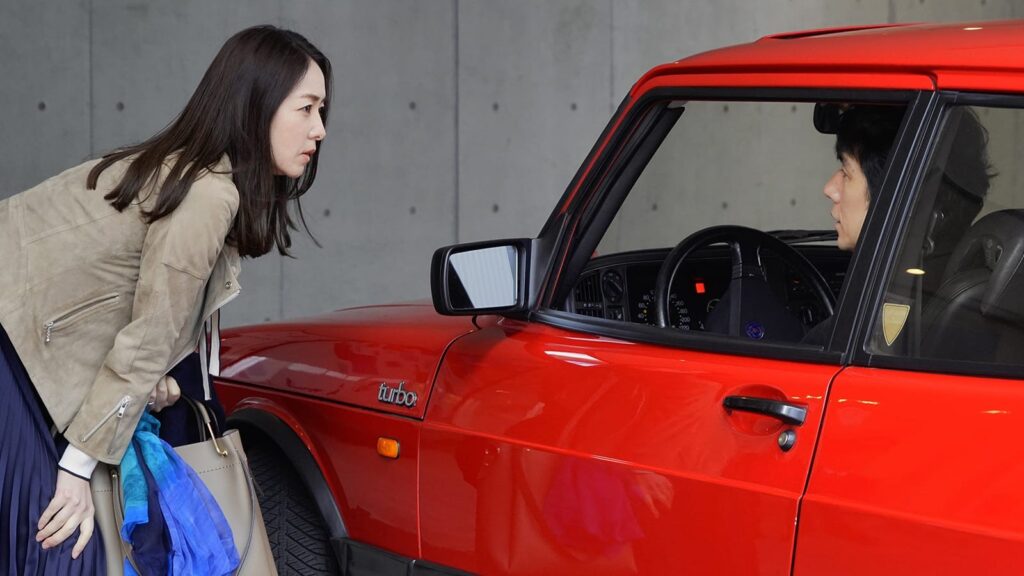Based on author Haruki Murakami’s story of the same name, director Ryusuke Hamaguchi’s adaptation proves to be a modest and powerful rendition of Murakami’s whimsical, layered tale of the human condition. While primarily taking story beats from the Drive My Car short story, the film is actually an amalgamation of all the tales in Murakami’s Men Without Women – a collection of short stories thematically woven around grief, loneliness and the complexities of companionship.
Hamaguichi (Happy Hour, 2015) brings the Japanese author’s observational literary style to life in a deceptively quiet film. The narrative twists and blends with the subtle and infrequent score, cinematographer Hidetoshi Shinomiya’s simple and intimate framing, and the cast’s nuanced performances, resulting in a film that is hypnotically melodic in its storytelling.
Murakami’s protagonists so often find motive and reason through supporting characters, almost lost and empty without philosophical input from others. Drive My Car embraces this through Yūsuke Kafuku (Hidetoshi Nishijima), a grieving actor and theatre director who would be nothing without the characters he runs into. Oto (Reika Kirishima), Lee Yoo-na (Park Yu-rim), Gong Yoon-soo (Jin Dae-yeon), Kōji (Masaki Okay), and Misaki (Tōko Miura) are all as important as each other. The narrative can be distilled down to a series of intricate and structured monologues, each one delivered by the fantastic ensemble cast as if they were Yūsuke’s own personified subconscience.
Lingering, intimate shots are used throughout the film, encouraging the audience to study the subjects on screen in much the same way as the characters study each other. The whole film has a beautiful contemplative air, often reminding me of Tom Ford’s Nocturnal Animals. The only establishing shots that don’t feature a cast member are of Yūsuke’s car, a red Saab 900 turbo. These shots are accompanied by Eiko Ishibashi’s subtle score, allowing time to digest any interactions that may have come before. The slow burning pace of Drive My Car actually adds another dimension to the moments of interaction; each word, phrase, and philosophical musing is allowed to swirl and embed themselves in our minds. There are moments too, thanks again to the pacing, which hit you like a freight train; often a revelation so deliberate and pivotal, offered to the audience in such a sudden and finely crafted way that any risk of slow pacing or long run time of Drive My Car can be swiftly forgiven. Of course, the screenplay owes a lot to Murakami, who’s novels dispatch important plot points in a similar manner.

Ironically contrary to the pacing, characters and the reasons for their inclusion are established quickly, the theme of grief and loss the constant among each of them. Each one seeking closure, or to be given a moment of clarity. There’s good chemistry between all the cast members, impressing the importance of each one to the story. The more layers that are peeled away from a character, the more similarities which connect each of them are exposed. No matter who they are, they are one and the same, experiencing trauma and the hardships of life, seeking guidance and the chance to finally rest.
Life imitates art by way of Anton Chekov’s play Uncle Vanya, the stage production that Yūsuke is trying to put on, and the tie that binds all of the characters together – brought to a close by a fitting monologue: “And when our final hour comes, we shall meet it humbly, and there beyond the grave, we shall say that we have known suffering and tears, that our life was bitter. And God will pity us. Ah, then, dear, dear Uncle, we shall enter on a bright and beautiful life. We shall rejoice and look back upon our grief here. A tender smile — and — we shall rest. I have faith, Uncle, fervent, passionate faith. We shall rest. We shall rest. We shall hear the angels. We shall see heaven shining like a jewel. We shall see evil and all our pain disappear in the great pity that shall enfold the world. Our life will be as peaceful and gentle and sweet as a caress. I have faith; I have faith. [Wiping away her tears] My poor, poor Uncle Vanya, you are crying! [Weeping] You have never known what it is to be happy, but wait, Uncle Vanya, wait! We shall rest. We shall rest. We shall rest.”
Drive My Car is a wonderful piece of melancholic and contemplative filmmaking. Its narrative journey is full of quiet and calm which makes the illuminating moments of revelation all the more powerful. Everything, from the pacing to the editing, is deliberately crafted and pieced together. The run time and pace could easily have been a barrier, but the story as a whole benefits from the methodical storytelling. The ambiguous ending will also stay with you long after you leave the cinema.
-
Drive My Car
Summary
A lesson in the complicated and fragile nature of companionship and the human condition. Drive My Car is a beautiful, melancholic film. Mesmerising for the entirely of its extensive run time.




